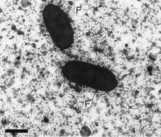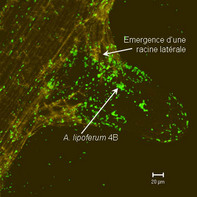Azospirillum lipoferum
Introduction
Azospirillum lipoferum, is a gram negative a-proteobacteria extensively studied due to its properties to influence plant growth, due to this symbiotic characteristic this bacteria is qualified as a Growth-Promoting Rhizobacteria (PGPR). The organism was first described by Martinus Beijerinck who named it Spirillum lipoferum , in 1925. Later, the classification was revised by Tarrand et al. who renamed it Azospirillum lipoferum which means "small, fat bearing, spiral".
Classification
Domain: Bacteria
Phylum: Proteobacteria
Class: Alphaproteobacteria
Order: Rhodospirillales
Family: Rhodospirillaceae
Genus: Azospirillum
Species: Azospirillum lipoferum
Metabolism
Ecology
Azospirillum lipoferum colonizes root plants forming a symbiotic Relationship where the plant benefits through N2 fixation, phytohormones, and hormone balance. The association with A. lipoferum promotes the elongation of plant roots. Constant genome rearrangements promotes population diversity leading as a escape mechanism to bypass host defenses.
Reference
http://www.genoscope.cns.fr/spip/-Azospirillum-lipoferum-.html
http://www.plantphysiol.org/content/125/4/2053.full
http://en.wikipedia.org/wiki/Rhizobacteria
http://www.idosi.org/aejaes/jaes8(6)/1.pdf
http://www.bacterio.net/azospirillum.html
http://www.straininfo.net/taxa/308;jsessionid=B15A4846847631CCCC748BDC2391FB0A.straininfo2
http://www.ncbi.nlm.nih.gov/Taxonomy/Browser/wwwtax.cgi?mode=Info&id=193


